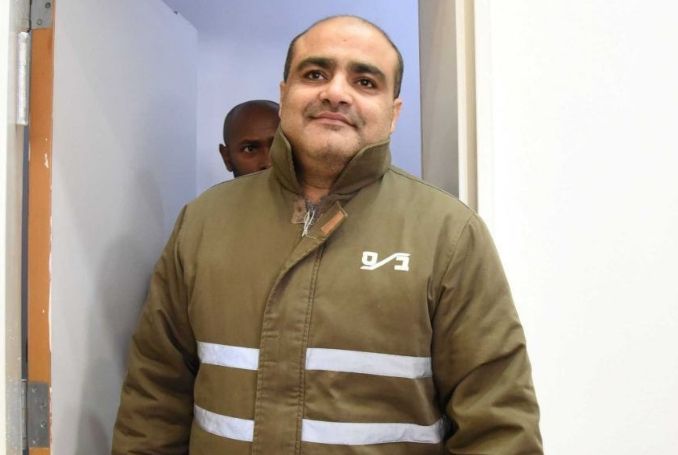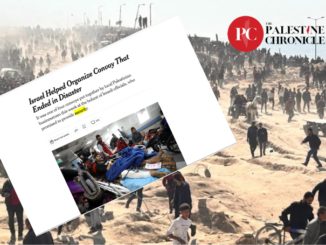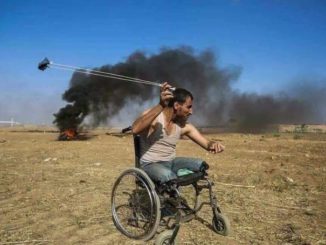
By Khalil Al-Halabi & Ramzy Baroud
Mohammed Khalil al-Halabi was born on April 2, 1978. He is the second of seven brothers. The al-Halabi family was ethnically cleansed from the town of Al-Majdal in historic Palestine in 1948, to live in permanent exile ever since. Mohammed was born and raised in the Jabaliya refugee camp in the Gaza Strip.
In 2003, Mohammed earned a Master’s degree in Civil Engineering from the Islamic University of Gaza. He is married with five children: Khalil, 15, ’Asem, 13, ’Amro, 9, Rital, 6, and Faris, 4.
In 2006, Mohammed became the Director of World Vision in Gaza, a US charity organization that, for 40 years, provided essential support to Palestinian communities in Jerusalem, the West Bank and Gaza, “serving the most poor and marginalized”. The Australian government provides a large portion of World Vision’s budget.
The charity’s work, like that of other international NGOs operating in the Gaza Strip, became critical after 2006 when Israel imposed a siege on the already impoverished region. Worsening an already stressful situation, several Israeli wars—starting in 2008—killed thousands of Palestinians in Gaza and destroyed much of the economic infrastructure of the Strip, leaving nearly half the population living under extreme poverty.
It was then that Mohammed’s work became essential for the survival of many, especially terminally ill cancer patients and families of fishermen and farmers who had lost their only source of income.
On June 15, 2016, Mohammed was arrested by Israeli occupation forces at the Beit Hanoun (Eretz) Crossing which separates besieged Gaza from Israel, in a joint operation carried out by the Shin Bet security service, the Israeli army and Israeli police. Since then, many have speculated that the real motives behind Mohammed’s detention were to sever the last line of international support that has allowed Gaza to survive, despite the siege and war.
Coupled with the numerous Israeli-imposed restrictions on the UN refugee agency in Palestine, UNRWA, and other similar groups, Mohammed’s case fits neatly into a more significant trajectory of Israeli efforts to undermine international support for the Palestinian people.
To obtain a confession, Israel has subjected Mohammed to what the Palestinian Commission of Detainees and Ex-Detainees’ Affairs refers to as “one of the longest trials in the history of the Palestinian captive movement”.
My Son Is a Humanitarian Hero
Mohammed’s ordeal began on June 15, 2016, at the Beit Hanoun (Eretz) Crossing. Israeli occupation soldiers arrested him on his way back from a World Vision meeting in Jerusalem. We only learned of his detention three days later. We were also told that he was being held in Askalan Prison.
My son experienced horrific torture while in Askalan. His interrogators accused him of funneling money to the resistance in Gaza. Absurdly, the sums of money he was accused of channeling to these Gaza groups exceeded the total budget of the Charity in the Strip. The whole story makes no sense.
Mohammed spent 52 days under constant and harrowing interrogation. From the very first day of detention, the Israeli intelligence officers placed a filthy bag over his head and hanged him from the ceiling for prolonged periods. They denied him sleep, and whenever they were done with their terrible deeds, they would throw him into an incredibly tiny cell, barely large enough for one person to sit down, let alone sleep. He would be left there without a mattress and a cover.
He was physically assaulted on numerous occasions. Each time, they would follow the same brutal routine: they slapped him, kicked him, especially in his genitals, and then strangled him until he felt that he was about to die. They would stop and resume a short while later. At times, they placed him in a small room and played deafening music until the pain in his ears became unbearable. As a result, he lost 40 percent of his hearing. In the summer, they would strip him naked, then blast him with flashes of warm air. They would repeat the same process in the winter, but with cold air, instead.
Mohammed’s lawyer conveyed all of this to us in the most graphic details. My heart is broken for my son. All he was doing was trying to help needy people. He often spoke of empowering the oppressed and disadvantaged in Gaza and, almost every day; he shared with me stories of the difference World Vision’s work was making in the life of ordinary people.
His time in prison and all the physical torture he was forced to endure have left him quite ill. Just the fact that they kept slamming him against the wall while shaking him repeatedly and violently, made him faint several times. But Israeli authorities refuse to let him see a doctor.
After they concluded their long and torturous interrogations, they transferred him to Nafha Prison, where he was paraded before a military court in Bir Al-Saba’. At the time of writing these words, my son has endured 115 official court sessions.
The occupation wants Mohammed to admit to things he has not done. He said as much to the lawyer, that, no matter what they did to him, he will not assume responsibility for acts he did not commit. Despite the lies of the Israeli Ministry of Foreign Affairs that Mohammed has admitted to diverting money to the resistance, my son officially pleaded not guilty to all charges against him in a district court trial in Bir Al-Saba’ on February 2, 2017.
However, everyone understands that the real reason behind all of this is that Israel wants to stop World Vision from operating in Gaza, a place that Israel wants to remain isolated, broken and pushed to its knees.
My son is an exceptional human being who has achieved so much in his young life, for his family and his people. He was featured in a UN campaign in 2014 as being one of the world’s “humanitarian heroes”. World Vision itself awarded him “Humanitarian of the Year” for his tireless efforts to aid Gaza under these harsh conditions.
Aside from all the work that Mohammed did to help the weakest sector in Gaza society, much of his efforts focused on helping sick people, especially cancer patients who were denied access to proper health care and, often, life-saving medicines. My son also focused much of his work on aiding the children who suffered numerous emotional and psychological scars as a result of the devastating Israeli wars.
Everyone knew my son, loved and respected him for the work he was doing, and all internal investigations, whether the one conducted by World Vision itself or by the Australian government, have absolved Mohammed from doing anything that runs contrary to the principles of charity work. But Israel refuses to set him free.
Now, Mohammed has been transferred, once again, this time to Rimon Prison, where he is being held under extremely harsh conditions, still experiencing all sorts of torture and degradation. Israel has no evidence to indict my son. Thus, it resorts to physically and psychologically tormenting him to get exactly what it wants to hear.
By charging Mohammed, the Israeli government intends to indict all international charities so that they suffocate Gaza and its heroic people entirely.
We miss Mohammed. Gaza misses Mohammed. Every single day I try to do all I can to raise awareness of my son’s cause. Thinking of him being mistreated in so demeaning a way eats me up on the inside. I want to hold him close to my chest and tell him how proud I am for all he has done for Gaza and the Palestinian people.
– Khalil Mohammed Al-Halabi was a Chief Field Officer and Special Advisor with The United Nations Relief and Works Agency for Palestine Refugees in the Near East (UNRWA). He contributed enormously to raising awareness about the dire situation in Gaza, during several international meetings with Jimmy Carter, Tony Blair, Ban Ki Moon, and John Kerry, among others. Now retired, al-Halabi spends his days raising awareness on his son’s unjust detention.
– Ramzy Baroud is a journalist, author and editor of Palestine Chronicle. His last book is ‘The Last Earth: A Palestinian Story’ (Pluto Press, London). Baroud has a Ph.D. in Palestine Studies from the University of Exeter and was a Non-Resident Scholar at Orfalea Center for Global and International Studies, University of California Santa Barbara. His website is www.ramzybaroud.net







